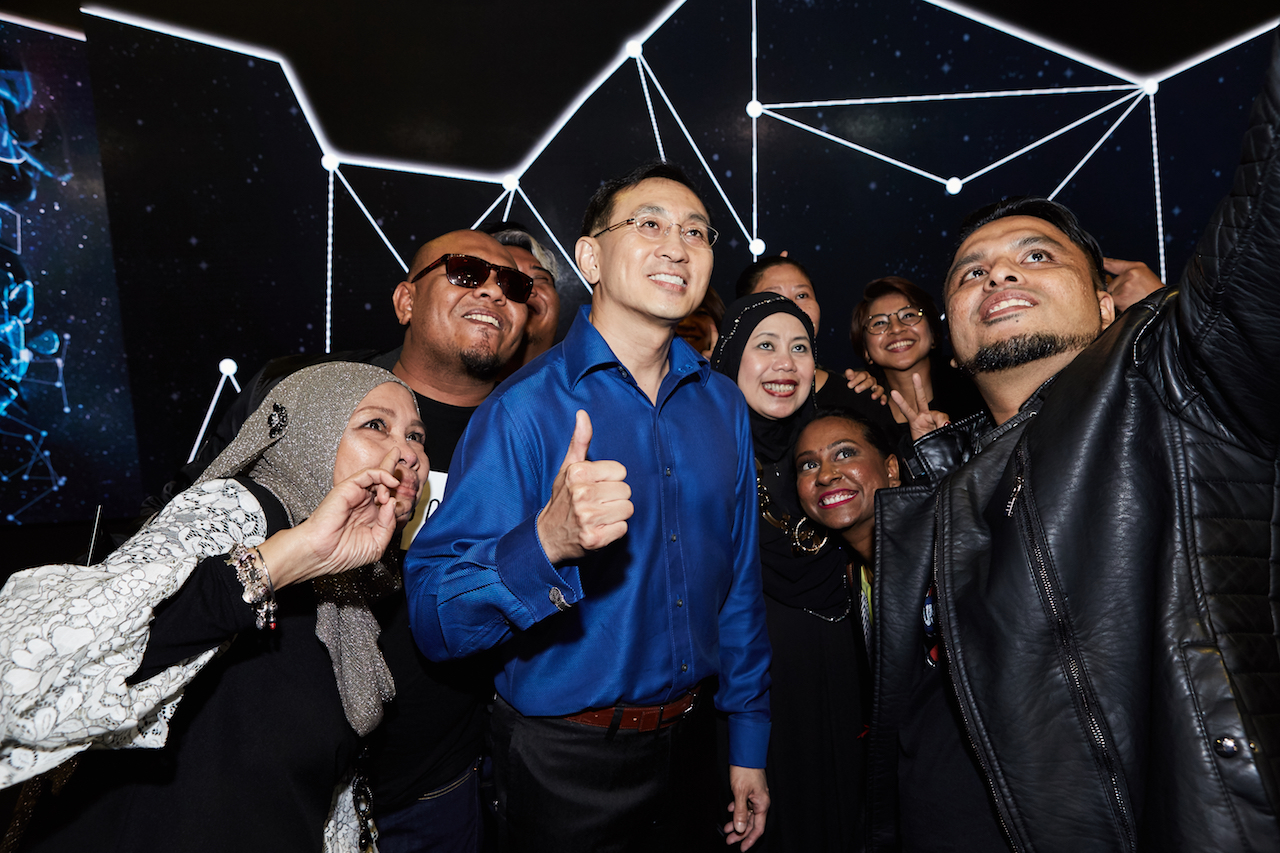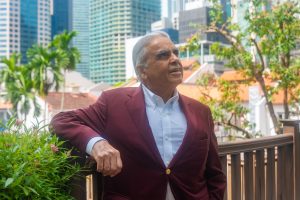This simple memory would remain so vivid that a current SMRT employee (who wishes to remain anonymous) would reveal just this anecdote when I speak to him about his former boss.
Back then, this employee and several others had accompanied Desmond on an overseas trip. They were waiting for their transport to ferry them to an important meeting when a Caucasian man, who appeared to be in his mid-twenties, approached Desmond. He asked if Desmond would entertain him with a round of chess. Most of the group would have politely declined; they didn’t want to risk being distracted from the meeting later on.
But the then CEO of SMRT stepped forward.
The same employee shares, “Desmond was kind enough to play chess with the guy. My colleagues and I saw the empathy he had for a complete stranger. I wrote a note to him after that, telling him that it was a good lesson for us.”
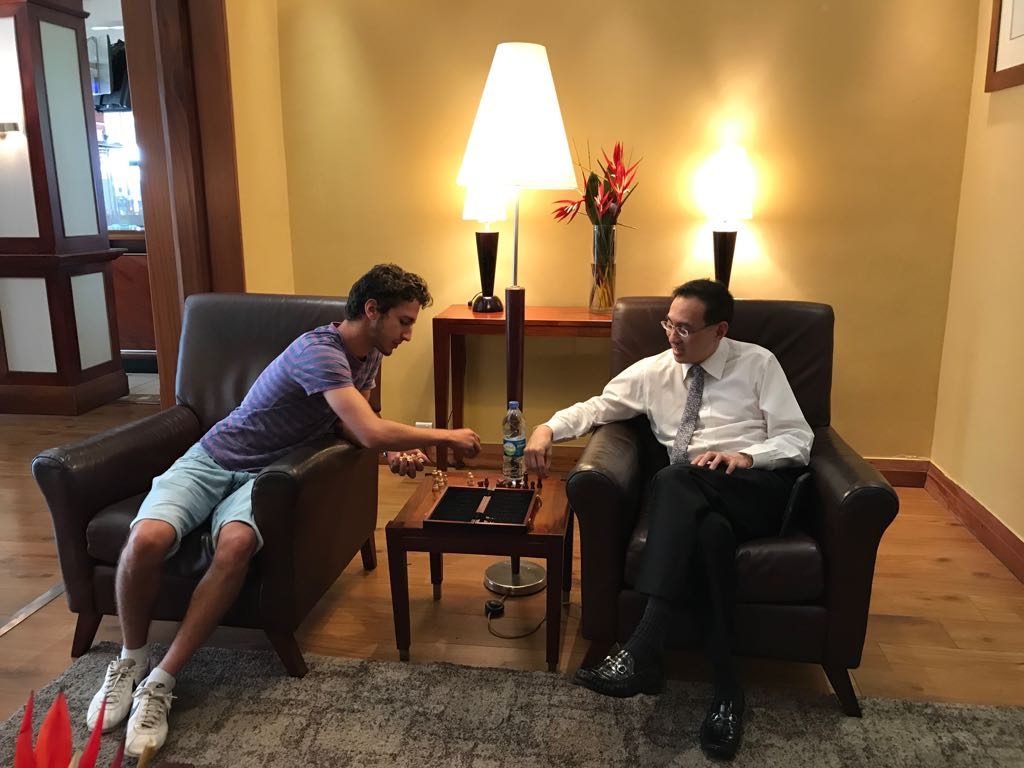
Frankly, Desmond Kuek has always been an enigmatic public figure. Sure, he was directly responsible for the privatisation of SMRT in 2016, among other company milestones. He also fronted numerous SMRT crises in the media throughout his six years as CEO.
Yet I only ever saw him through a single lens: he was the guy everyone hated. Everything he did seemed ripe for ridicule.
The irrational hate for Desmond and SMRT felt like a symptom of a larger disenchantment with the ruling party that had been brewing since the 2011 General Elections. With public transport a staple in almost everyone’s lives, complaining about SMRT quickly became a unifying thread among disgruntled Singaporeans. And Desmond was an easy target.
Many were unhappy that he appeared to have been ‘parachuted’ into his role from the Singapore Armed Forces. It didn’t help that a string of major, unfortunate incidents happened during his tenure, fuelling public ire.
For instance, there was the massive power trip in 2015 that caused the North-South and East-West lines to be shut down. Then there was the death of two SMRT employees in 2016, and the Bishan tunnel flooding in 2017.
None of these were his fault, but he bore the blame. If life were a chess game, Desmond appeared to be losing. Fast.
Then just as effortlessly as he had assumed the spotlight, he eased out of it. Since his official departure from SMRT on 1 August, the former CEO has successfully remained under the radar. Desmond politely declined my several requests to be interviewed. I conceded; after six years of enduring online abuse from people who don’t even know him, he wanted to stay low key.
So I turned to the ones who would be equally privy to all aspects of Desmond’s personality: current and former SMRT employees who had worked directly with him.
Had public outrage been justified? Was he just a useless, out-of-touch PAP puppet as certain netizens liked to claim? Who exactly was Desmond Kuek, the longsuffering boss, colleague, and friend?
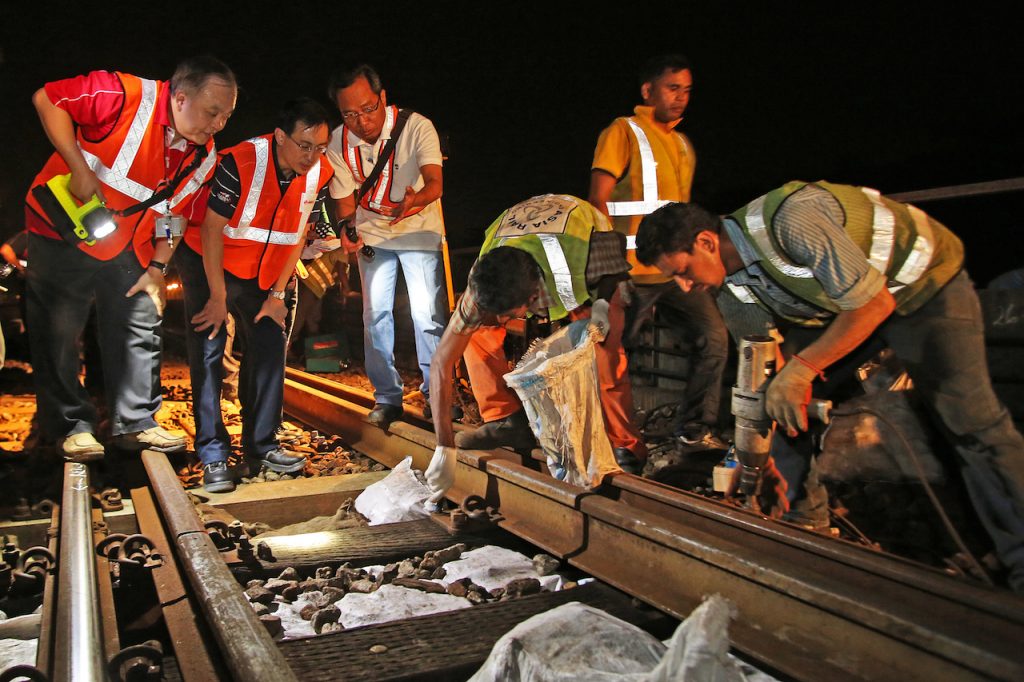

This is what Patrick Nathan, SMRT’s former Vice President of Corporate Communications, shares over coffee. Patrick prefaces his answers by saying he doesn’t owe his former boss anything, and that he used to be “quite a hard person” on the job. Patrick also claims that anyone who has worked with him knows he shoots from the hip, regardless of who’s involved.
Even so, I am skeptical about this observation. It directly contradicts public knowledge, and I still distinctly remember the field day that was Desmond’s scowling face going viral, captured during the Parliamentary debate following the Bishan tunnel flooding.
Desmond Kuek—patient, empathetic, responsible. Really?
“Desmond and I argued a lot. Or rather, I argued with him,” explains Patrick.
“He was extremely forgiving. I even told him several times, ‘Thank you, you’ve been very patient.’ Even when I got too argumentative, and bordered on being rude, he knew that it came from the right place.”
Maintaining a cool composure when you have every reason to flip out is an underrated quality in any boss. But when you work for a company that seems to be thrown into an increasingly deeper end of the pool every other day, the ability to remain calm in a crisis becomes your lifebuoy.
And here was a crisis management expert going on the record about Desmond being an asset in a crisis.
Patrick explains, “It doesn’t help when your crisis management leader comes in upset. You don’t start a conversation in a crisis by asking why it happened in an accusatory tone. Desmond never did that; he never raised his voice.”
“When Desmond came into a crisis management room, he just wanted to be updated on what [was] being done,” he adds.
“If you look at press conferences or doorstop interviews, you’ll hear him taking responsibility for what went wrong. The buck always stops with him.”
It surprises me that this coolheadedness is consistently mentioned in every single one of my interviews, particularly since most of my interviewees worked with Desmond under vastly varying capacities. Like many others, I’m equally surprised at his sense of duty, because most of us simply remember Desmond vaguely claiming that “deep-seated cultural issues” were a cause of SMRT’s mishaps.
Yet two former SMRT employees, who worked on strategy with Desmond, remember their former boss to be an even-tempered man. One of them, Bernard Cokro, has witnessed him disagreeing with others. But it was precisely these disagreements that highlighted his natural communication skills.
“Desmond is very articulate and brings across his points clearly. There are no banging of tables or the like. I’ve never seen him get angry. Ever. It’s quite admirable, considering how there’s something cropping up every day in SMRT,” he says.
Likewise, Ryan Tan adds, “There were instances when management lost their cool and argued with each other. Desmond handled it with maturity. He’s quite genteel. Obviously, for the benefit of the more obtuse among us, sometimes you wish he can be more direct.”
Desmond understood that a great boss needed to be tough but not hard—a nuance many leaders have trouble distinguishing.
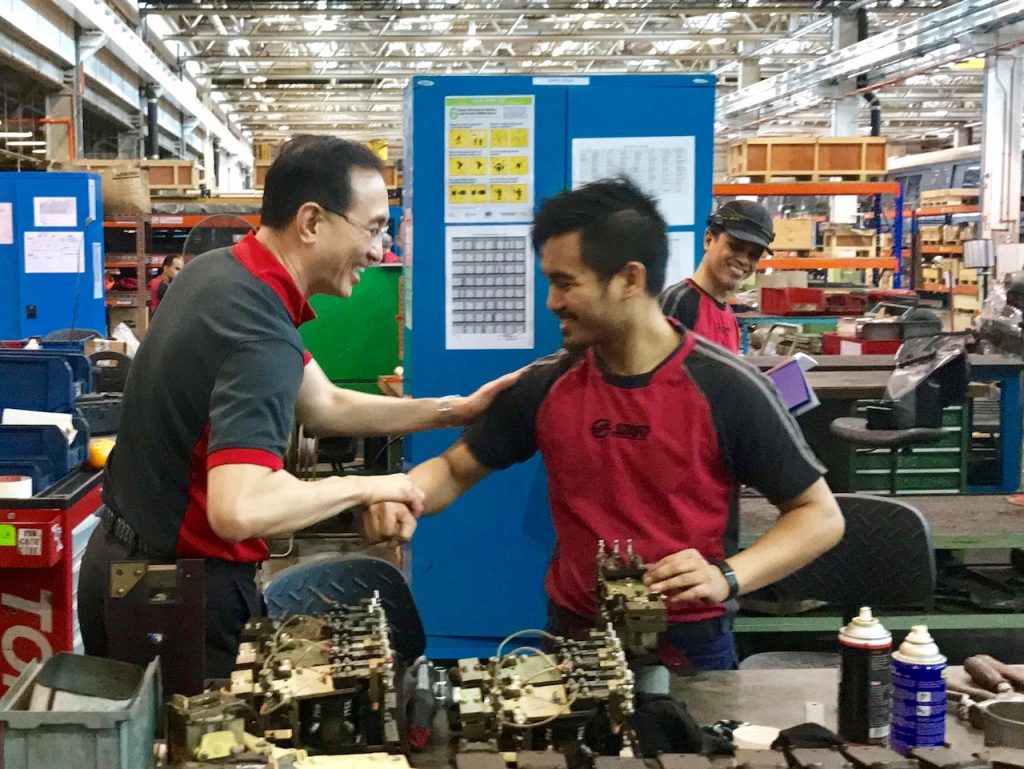
Back when he first found out about the two SMRT staff who had been killed in an accident on the job, he immediately met with their families before attending the funeral on the same day.
With SMRT’s ground staff, Desmond frequently struck a perfect balance between being a CEO and a colleague. He was able to extend compassion for anyone while retaining a sense of control; he knew how to use the right tone at the right time for the right person.
Patrick, who would occasionally accompany him on the ground, informs me that this innate ability to connect is quite rare, as many CEOs tend to be “uni-dimensional”.
“He knows how to bring out the different Desmond Kueks. As a CEO, he encouraged and rallied. But as a colleague, he sat down and talked about employees’ families, what it’s like at the workplace, whether they were comfortable, and if they looked forward coming to work every day,” says Patrick.
This compassion meant he took an interest in employees’ personal lives outside of work. Often, he would spend time after work getting to know his younger staff, from joining the SMRT running team to having a drink at CHIJMES.
In fact, when Bernard planned to propose to his girlfriend, Desmond got “very excited”, as though someone in his own family was getting married. He would ask Bernard “when it was” and “where it was going to be held”.
Apparently, this was typical Desmond behaviour. Tony Heng, the managing director of SMRT Taxis, says it was common for Desmond to ask about his employees’ families, treating them like his own.
“My wife and I had dinner together with Desmond and his wife a few times. He’s probably the only boss that extends this sort of treatment even to our families. Personally, I am quite touched that he’s so open to us,” he shares.
In another instance, a maintenance staff within SMRT’s car servicing workshop spoke to Ryan about Desmond, not knowing that Ryan reported directly to him. The staff had told Desmond about a family member, who had undergone an operation for a traumatic head injury.
Ryan then shares, “This employee was very moved when Desmond reached out to him two to three weeks later to ask how his family member was doing. That conversation he had with Desmond wasn’t treated as just any random conversation.”
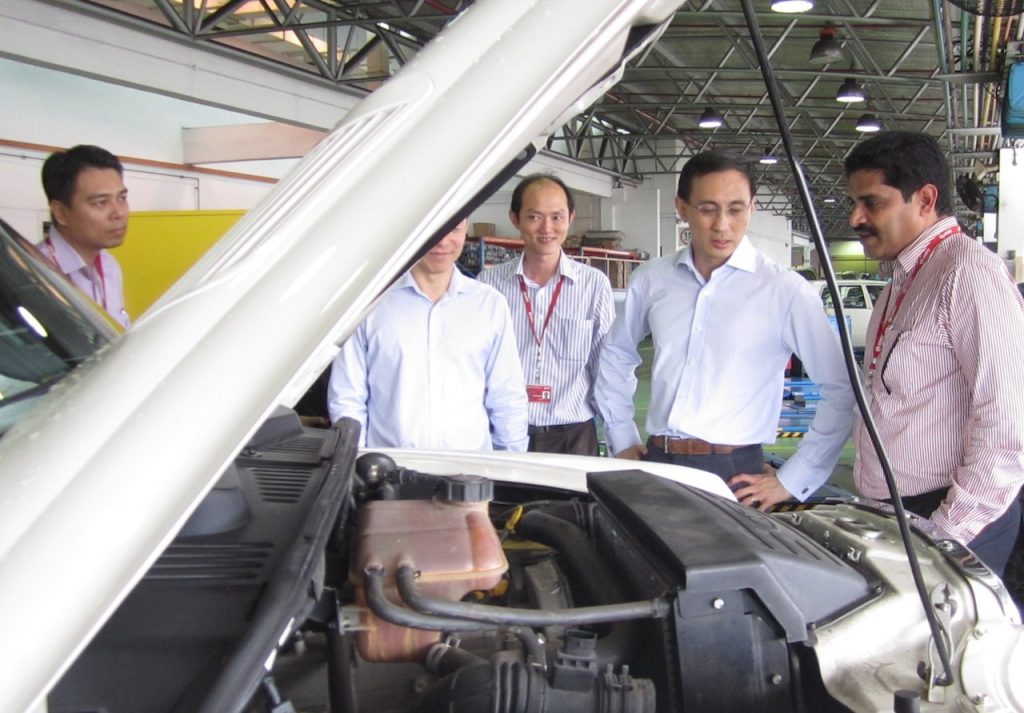
The average Singaporean remains clueless about any of this, largely thanks to SMRT’s impenetrable PR strategy.
As a public-facing, public-serving company, their focus remains strictly on commuters. When they have to shape public perception by dealing with public enquiries from the Land Transport Authority (their regulator), Parliament, and irate netizens, the image of their CEO simply can’t be top priority.
Inadvertently, the image of Desmond Kuek the public figure diverged dramatically from Desmond Kuek the boss.
At least this is what I gather from those who used to work with him. As a boss, Desmond was consistently open to being wrong. He wasn’t fixated on his way of doing things, and could always be persuaded with a better solution.
While those I interviewed have all at some point articulated their disagreements with him, they admit that they were able to do so mainly because Desmond had created an open environment, one that reassured them they would be taken seriously regardless.
Desmond remained approachable, even when he needed to act under different constraints by reporting to various stakeholders.
Ryan says, “When I disagreed with something, I’d tell him, ‘Look boss, I know you’re the boss but these are my views. You might want to consider this.’ And I could always count on him to listen to me at least. That’s what you want in a boss.”
In Ryan’s own words, this comes from a “deep inner strength”. It also means being confident enough in your vision to have it challenged; not getting defensive when questioned, and being willing to make room for both different perspectives and enriching discussions.
To me at least, it seems that Desmond’s values have rubbed off on his employees.
Ryan goes on to share, “When he asked me to do important transformation projects, it was very hard to get senior management going. I was the youngest guy, and there were many power struggles. Desmond told me, ‘Ryan, you shouldn’t worry what people think about you.’ Those were very powerful words that I still return to whenever I face challenges at my current job.”
Those who still remain at SMRT are more than willing to admit that Desmond’s leadership changed the way they wanted to lead their own teams and the values they hoped to pay forward.
Tony, for instance, has always considered himself more “operational and executional”, often erring on the side of caution. In contrast, Desmond was a “visionary”, which Tony says taught him to be less aggressive and more assertive.
“It’s always been obvious to us that we’re serving the nation. This is the MRT, after all. People take pride in this job, much of which was instilled by Desmond over the last few years,” he adds.
Another current employee, Alvin Tan, the deputy director of human resources, recalls seeing Desmond take flak from stakeholders during the Bishan flooding incident. Despite the heavy criticism levelled against him by the public and ministries alike, he never shirked responsibility to protect his reputation. After the issue died down, Alvin wrote Desmond a note to thank him for being a role model.
“It changed the way I saw leadership and made me question if I would ever measure up to the bar that he set for us. Perhaps not, but I will never stop trying.”
I am reminded of a piece of advice someone gave me at the start of my career: a great boss won’t just make you believe in them. They also help you believe in yourself.

Along with my interviewees, I understand that this article might come across as a puff piece. Admittedly, some of my interviewees might have wanted to correct public perception of a man whom they believe was treated unfairly during his time in the spotlight. As one of them puts it, there’s nothing wrong with having the courage to talk about a caring (former) boss.
Yet I doubt that any of these anecdotes are fiction; I too have spoken of my own former boss with the same degree of respect and gratitude that I see these individuals speak about Desmond.
Patrick, for one, has this to say: “I don’t want to be apologetic about having a good relationship with Desmond. If there is a good relationship, just say so. That’s more important than trying to bring up some imagined character defect of Desmond’s just to be balanced when that is not the case.”
So if Desmond was really as great as everyone said he was, why hasn’t the average Singaporean heard of his supposedly amazing personality?
After two months of speaking with my interviewees and understanding SMRT’s unique position, I have my answer. When you work for a company that’s constantly under attack from the media, the public, and occasionally even your own regulator, you quickly become desensitised to the criticism. You stop seeing the point. You realise: why fight back when you can let your work speak for itself?
Essentially, it’s unlikely anyone in SMRT would have publicly spoken about their former boss if this stubborn reporter (me) hadn’t come knocking.
I wasn’t going to mention Desmond since he didn’t want to be interviewed. But somehow, over an hour and a half at a cafe in CHIJMES where we met for the first time, this 56-year-old man became my peer.
He set me at ease the minute he sat down opposite me, which is a gift I did not expect him to possess. His candour wasn’t cloying, as it tends to be when people are desperate to impress. Nor did it feel like an elaborate performance hiding ulterior motives.
While he never claimed to be unreserved or honest, he was.
Just before parting ways, he asked if I enjoyed what I did. I said I did, but added that I sometimes didn’t know if my work mattered.
Merely strangers less than two hours ago, Desmond looked me in the eye and replied, “Let me tell you now, it does.”
As a chess player, you begin every game with a plan in mind. You don’t retaliate at every turn; you wait. In Desmond’s case, his strategy has always been to be himself.
If his former and current employees’ recounts mean anything, then he is a masterclass strategist and chess player. And so, whatever his next move may be, it will be a winning one. It is as Maya Angelou says, “People will forget what you said, people will forget what you did, but people will never forget how you made them feel.”
SMRT knew it never needed to defend their former boss against the flames of public dissatisfaction, because the fire would eventually put itself out. And after the dust had settled, there would be just one word to describe the quiet, lasting legacy of Desmond Kuek.
Checkmate.

